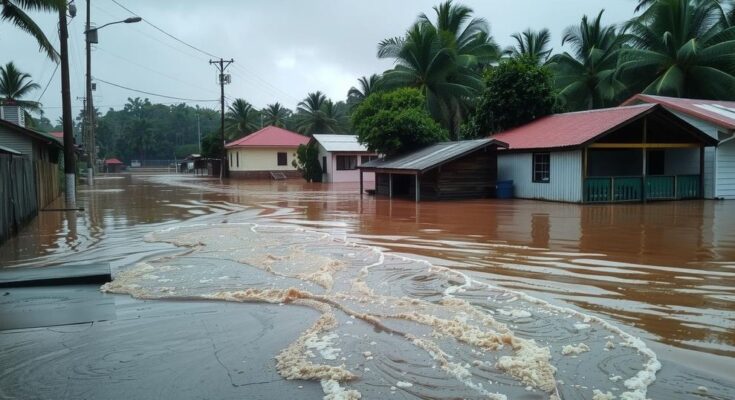Tropical Storm Sara has isolated over 1,700 communities in Honduras due to torrential rain, affecting more than 110,000 people. The storm has caused significant infrastructure damage, including destroyed bridges and homes. Meteorologists attribute the increased storm severity to climate change.
Tropical Storm Sara has severely impacted Honduras, leading to the isolation of over 1,700 communities due to heavy rainfall. This slow-moving storm unleashed extensive flooding across the nation, resulting in significant damage to infrastructure. As preliminary assessments indicate one confirmed fatality and over 110,000 individuals affected, authorities are working to address the crisis. Forecasters predict further weakening of the storm as it moves into southern Mexico.
Originating in the Caribbean Sea, Storm Sara brought relentless rainfall to northern Honduras for four days before shifting towards Belize and Mexico. Certain regions experienced nearly 500mm (19.7 inches) of rainfall, causing rivers to overflow. Reports from the Honduran emergency services revealed the destruction of nine bridges and damages to 19 others, alongside landslides that made several highways impassable.
Honduran President Xiomara Castro proactively warned residents near riverbanks to seek shelter, a call that was heeded by thousands. Initial assessments reveal damage to over 2,500 homes, with more than 200 completely destroyed. As the 18th named storm of the Atlantic hurricane season, Sara follows closely behind Hurricane Rafael, which had previously caused a nationwide blackout in Cuba. Meteorologists attribute the intense storm activity to elevated sea surface temperatures, emphasizing the role of climate change in increasing the severity and frequency of such weather events.
Hurricane and tropical storm phenomena, while natural occurrences, are being intensified by human-induced climate change, leading to enhanced risks of catastrophic damage. Kevin Trenberth, a distinguished scholar at the National Center for Atmospheric Research, has pointed out that the influence of climate change exacerbates the impacts of these storms.
Through comprehensive emergency response efforts, the Honduran government aims to aid those affected and rebuild communities in the aftermath of Storm Sara, all while addressing the broader implications of climate change on weather patterns in the region.
Storm Sara exemplifies the increasing severity of tropical storms fueled by climate change. The unprecedented rainfall and flooding in Honduras not only highlight the immediate humanitarian crisis but also raise concerns regarding the long-term impact of such extreme weather events. As storms become more frequent and intense, affected regions face significant challenges in recovery and resilience. Understanding these dynamics is crucial for policymakers and communities as they prepare for future storms.
In summary, Storm Sara has caused considerable devastation in Honduras, affecting vast numbers of people and infrastructure. While immediate responses are underway to assist those impacted, the event underscores the broader challenges posed by climate change in exacerbating weather phenomena. The increasing frequency and severity of storms necessitate comprehensive strategies for disaster preparedness and climate adaptation to mitigate future risks.
Original Source: www.bbc.co.uk




